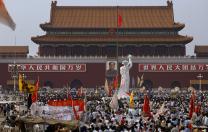Since 2010, Rowena Xiaoqing He, a lecturer in the department of government, has taught a freshman seminar titled “Rebels With a Cause: Tiananmen in History and Memory.” Through a combination of primary source material and scholarly accounts, students reconstruct the fraught history and legacy of an event that, in China, remains politically taboo. “For my students, who were not even born in 1989, Tiananmen is not a memory, because they never lived through it,” says He. “For them, Tiananmen is history.”
The event is memory for He, a student participant in the 1989 protests in Guangzhou, who brings a personal dimension to the course: recounting her experiences; arranging a visit to the Tiananmen archives at the Harvard-Yenching Library, which contain thousands of photographs, manuscripts, and artifacts; and inviting exiled student leaders to speak to the class about their experiences. Indeed, He’s recent book, Tiananmen Exiles: Voices of the Struggle for Democracy in China, interweaves her own story with oral histories from exiled activists Yi Danxuan, Wang Dan, Ph.D. ’08, and Shen Tong, author of Almost a Revolution, to reflect on the conflicts and contradictions of a life in exile.
The seminar culminates in a conference, where students present their final projects for the course to a wider audience. This year, for the movement’s twenty-fifth anniversary, it included panels of academics, journalists, and exiled leaders, who reflected on the demonstrations’ lasting personal and political impact. The course has not escaped its own controversy. A Chinese man told one student not to take the course because it represented a biased version of history, and each year, some students, usually those from mainland China, ask for their names and appearances to be withheld from the publicly accessible course website. Nevertheless, He sounds a note of optimism. “Tiananmen may remind us of oppression, but it is also a reminder of the human spirit,” she said, closing the conference this year. “History is on our side.”








